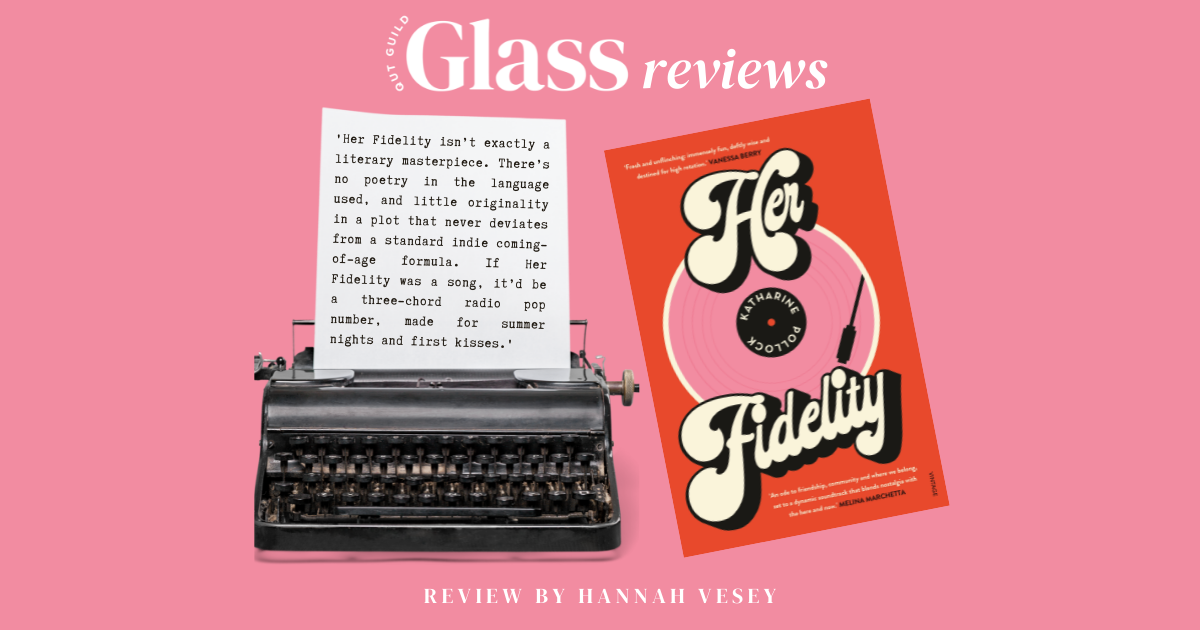Review by Hannah Vesey
Sometimes I keep books on my shelf so that I’ll remember who the enemy is.
No, I’m not talking about Katherine Pollock’s fun and breezy debut novel Her Fidelity (we’ll get to that one later).
I’m talking about every indie romance written by a male author. You know the sort of book I’m talking about. She’s a beautiful liar, stuck in a suburban daydream of early morning traffic and late-night tv. She’s mentally ill, but in like, an aesthetic way. We all know that it’s pretty hot when women suffer. He’s a musician with a broken heart and a durrie addiction. He’s constantly drawing the attention of girls, all of whom are desperate, slutty, fat, dressed in Taylor Swift merch, or otherwise unacceptable. He wants a girl who likes rock music, man. The two lovers meet at a gig. He looks down her shirt, sees her tits, and sparks fly. We are informed that the female protagonist has smouldering eyes, high cheekbones, and firm, shapely buttocks. You can almost imagine the author putting aside his naughty pictures of Thom Yorke so he can jerk off to his leading lady instead.
Of course, there’s nothing wrong with a bit of male fantasy. Especially when it’s not explicitly sexist. But the thing about harmless, benign male fantasies is that they’re everywhere. A diet of male fantasies will fuck you up.
So, Glass gave me a copy of Her Fidelity by Katherine Pollock, my expectations were as low, in spite of the non-male name on the front cover. I expected another book that promotes the idea of the stereotypical cool girl while talking down to everyone who doesn’t fit the ideal. As a disabled woman, I’m used to finding myself in the white spaces on the edges of the pages, in the words that are left unsaid. So, I held my nose as I opened Her Fidelity. Even the title stinks of red lipstick, smudged eyeliner, and perfection.
Fortunately, my assumptions were wrong.
Right from the first page, Katherine Pollock rejects patriarchal notions of femininity to create characters who are complex and imperfect. Protagonist Kathy is too fat to be beautiful, too angry to be cool, and too brave to be silent. She’s worked at the same male-owned record store for fifteen years, and it hasn’t been pretty. She’s been harassed and sexually assaulted by men in the music industry, and has everything to lose by speaking up. Stressed, underpaid, and overworked, Kathy avoids thinking about her crappy job by binge drinking with best friends Mel and Alex. In spite of her long list of sexist ex-boyfriends, Kathy hasn’t stopped believing in true love. She listens to her records and dreams of a guy who’ll be her mirror and fill her like the sea. But Kathy can’t live in daydreams forever. When her friends start climbing the career ladder and partnering up, our girl realises that she’s stuck in a groove. Inspired by her favourite pop divas and punk rock poets, Kathy leaves the boys’ club and sets out to create a club of her own.
You’d think that with the all the talk of sexism and discrimination, Her Fidelity would be a depressing read. But Pollock chooses humour over tragedy, infusing even the darkest moments with music references and sly, filthy jokes. Take the scene where Kathy’s parents discover her reading Dawson’s Creek erotica, or Pollock’s takedown of the indie record store fairy tale, through Kathy’s encounters with shit-smeared carpets and stoned customers humping the front counter. Another refreshing aspect of the book is Pollock’s refusal to play to some of the more common genre conventions. Kathy isn’t a manic pixie dream girl, a conveniently blank slate for a boy to pour his emotions onto. She doesn’t sit around in her David Bowie t-shirt, watching tv and waiting for Prince Charming to walk through the door. While a romance storyline does feature heavily in the novel’s second half, Kathy is someone who knows when to prioritize friends, family, and her career. Kathy is invested in her relationship with love interest Patrick, but she’s also open to breaking up if they can’t make it work. ‘Our relationship was a total eclipse of the heart,‘ she reflects. ‘But there’s more than one eclipse in a lifetime.’ In a genre where relationships are often dictated by fate and destiny, Pollock suggests that the story doesn’t end after we let go.
Her Fidelity isn’t exactly a literary masterpiece. There’s no poetry in the language used, and little originality in a plot that never deviates from a standard indie coming-of-age formula. If Her Fidelity was a song, it’d be a three-chord radio pop number, made for summer nights and first kisses. But I don’t discriminate according to genre. We need pop songs as much as we need blues or jazz. We need books that are challenging and profound; we also need books that make us laugh. And we need books that remind us how to stand up to sexism, even if we’ve heard it a thousand times before. Heartfelt and deeply funny, Her Fidelity distils the messages from all your favourite songs. If he’s treating you badly, tell him boy, bye. If he’s holding you down, make him regret ever kissing you. If he calls you brainless, take it like a girlboss and shake it off.
Her Fidelity is available now from Penguin.
Hannah Vesey is a thrift-store-clothed coffee addict with a passion for eavesdropping on strangers’ conversations. You can find more of her work in ScratchThat Magazine, Urinal Mag, the QUT Literary Salon 2021 collection, and on her Instagram, @hannah_vesey_ .






